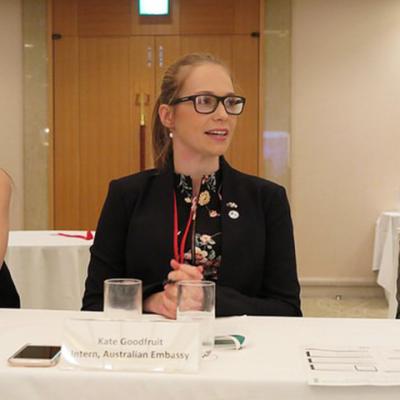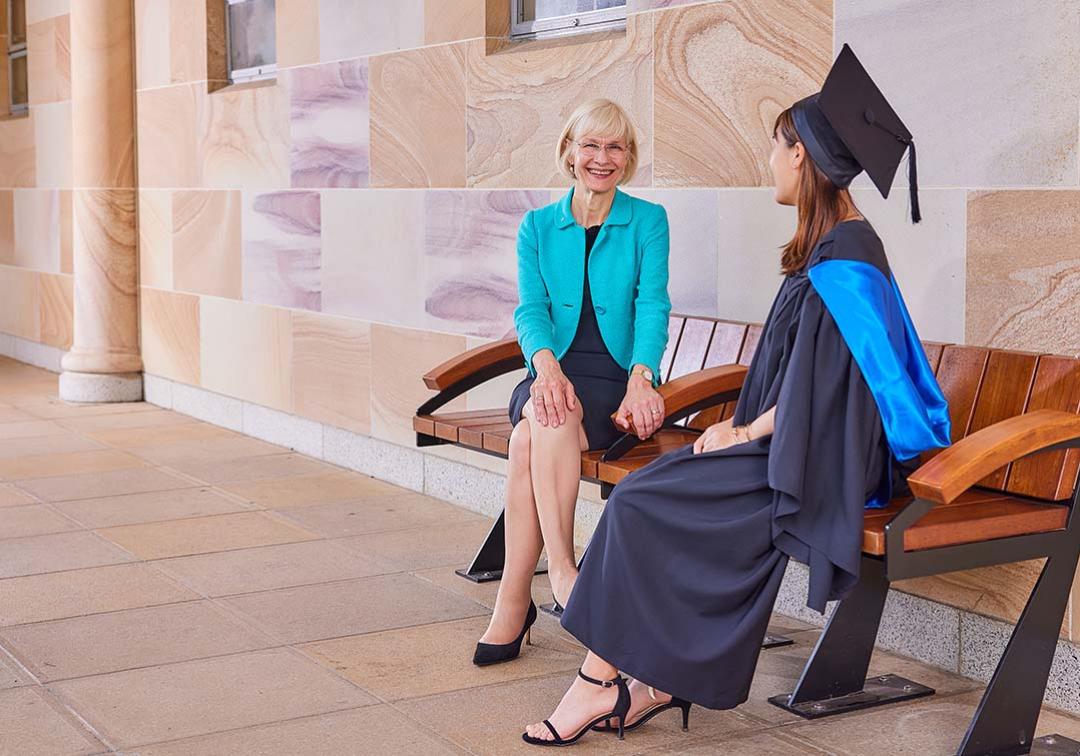
Bachelor of International Studies
Overview
A global career with endless opportunities. Study the only program in Australia that includes language training, an international studies major and a semester abroad.
The Bachelor of International Studies is focused on developing language skills and knowledge of global issues from the perspective of relevant social science disciplines.
The program consists of three components: core studies, a language major and an international studies major. You'll complement these studies with a compulsory overseas exchange semester to enhance the development of your cross-cultural understanding and communication skills.
You can choose from a comprehensive range of courses, all of which provide grounding in the political, social and communicative aspects of international and global issues.
Your semester abroad gives you the opportunity to experience living, studying and maybe even travelling in another country. A great experience, but also something that demonstrates to future employers that you’re able to function well outside your comfort zone. Combining this semester abroad with your language also allows you to ‘bed down’ that language and move a step closer to fluency. Whether ordering fresh croissants from a boulangerie in Paris, a plate of empanadas from a café in Buenos Aires or a bowl of kimchi in Seoul, your exchange semester abroad will be an unforgettable experience.
Program highlights
- Finish your degree fluent in a second language, with a sophisticated knowledge of things international and with the experience of living abroad.
- Benefit from a truly international experience, with an overseas exchange semester at one of UQ’s many prestigious international partner institutions.
- Choose from Queensland’s largest selection of language majors.
- Select study options that provide context to transnational issues and global understanding.
Majors
Tailor your studies to suit your goals. This program offers these options:
- Chinese
- Chinese Translation and Interpreting
- Economics
- French
How you'll learn
Your learning experiences are designed to best suit the learning outcomes of the courses you choose.
- Lectures
- Tutorials
- Work placements
- Overseas study
- Fieldwork
What you'll study
At UQ, degrees are called 'programs' and subjects are called 'courses'. Here's a sample of the courses you could study in this program:
- Communicating Across Cultures
- Culture and World Politics
- Learning from the International Experience
- Globalisation & Development in Post-Colonial Societies
Career possibilities
Our programs prepare you for your first job and beyond. Depending on which major you choose, here are some of the careers you could be on your way to:
- Diplomatic corps official
- International aid worker
- Foreign policy adviser
- Development program coordinator
- Intelligence analyst
- Business analyst
Next steps after graduation
Our graduates find themselves in a genuine range of jobs. Plenty have had success cracking highly competitive jobs in the Commonwealth and state public service, from Foreign Affairs and Trade to Defence, Home Affairs and Prime Minister and Cabinet. Others find themselves working for international companies- in Australia and overseas- while still others take up jobs in translation, policy analysis or research for a wide range of public and private employers. You can also complete an Honours year or study a postgraduate program in International Relations, Peace and Conflict Studies, Development Practice, Governance and Public Policy, or Translation and Interpreting.
Events
See all events
29 June
Voyages to the Underworld: UQ Centre for Western Civilisation Winter School
Stories
See all stories
Careers
Powering up: UQ programs fuel next generation of sustainable energy leaders
5-minute read
Stories
See all stories
Careers
Powering up: UQ programs fuel next generation of sustainable energy leaders
5-minute read
Entry requirements
Prerequisites
- General English subject (Units 3 & 4, C).
Prerequisites
- General English subject (Units 3 & 4, C).
Entry score threshold
| ATAR / Rank | IB |
|---|---|
| 82 | 31 |
These are the lowest adjusted scores we made an offer to in Semester 1, 2025. Entry scores are based on the most recent Semester 1 intake and are updated in April each year. Meeting the entry score threshold doesn't guarantee admission.
Guarantee your place at UQ: If you meet our guaranteed minimum ATAR you could secure an offer for your preferred program.
English language requirements
IELTS overall 6.5; reading 6; writing 6; speaking 6; listening 6. For other English Language Proficiency Tests and Scores approved for UQ
TOEFL iBT (including Paper Edition) - Overall 87, listening 19, reading 19, writing 21 and speaking 19.
PTE Academic - Overall Score of 64 and 60 in all sub bands.
BE - A minimum overall grade of 4 plus a minimum grade of C in all macro skills.
CES - Overall 176 and 169 in all sub bands.
OET is not accepted.
There are other ways to meet the English language requirements. For some programs, additional conditions apply.
Student visas
International students who are accepted into full-time study in the Bachelor of International Studies are eligible to apply for an Australian student visa (subclass 500).
There are a number of requirements you must satisfy before a visa is granted, including the Genuine Student (GS) requirement.
Entry score range
This table shows the range of entry scores for recent secondary students offered a place in the B International Studies for Semester 1, 2025
| Without adjustments | With adjustments | |
|---|---|---|
| Highest | 98.25 | 99.95 |
| Median | 89.7 | 91.05 |
| Lowest | 80.05 | 82.05 |
Who you'll study with
Here's a snapshot of our student intake for this program in Semester 1, 2025:
| Applicant background | Number of students | Percentage of all students |
|---|---|---|
(A) Higher education study | 23 | 23.7% |
(B) Vocational Education and Training (VET) study | 5 | 5.2% |
(C) Work and life experience | 8 | 8.2% |
| (D) Recent secondary education | ||
| 54 | 55.7% |
| 0 | 0% |
| 0 | 0% |
International students | 7 | 7.2% |
Total | 97 | 100% |
"<5" — The number of students is less than 5.
N/A — Students not accepted in this category.
N/P — Not published. The number is hidden to protect the privacy of students in other cells.
Need help meeting the entry requirements?
Majors
Majors
Tailor your studies to suit your goals. This program offers these options:
Majors
Tailor your studies to suit your goals. This program offers these options:
Fees and Scholarships
Indicative annual fee
Approximate yearly cost of tuition (16 units). Your fees will vary according to your selected courses and study load. Fees are reviewed each year and may increase.
$13,835
2026
Approximate yearly cost of tuition (16 units). Your fees will vary according to your study load. Fees are reviewed each year and may increase.
AUD $45,792
2026
Government assistance
Financial aid
As an international student, you might be eligible for financial aid – either from your home country, or from the Australian Government.
HECS-HELP
Domestic places in the Bachelor of International Studies are Commonwealth supported, as long as you meet all Commonwealth supported place eligibility requirements.
This means the cost of your education is shared between you and the Australian Government. Instead of tuition fees, Commonwealth supported students pay what are called student contribution amounts.
If you have a Commonwealth supported place, you may also be eligible for HECS-HELP. This is an Australian Government loan scheme to assist eligible students with the cost of their student contribution amounts.
Centrelink support
The Australian Government offers a number of income-support payments to eligible Australian university students.
Scholarships
You may be eligible for more than 100 scholarships, including:
How to apply
Applying online
If your senior schooling is from outside Australia, you can submit your application to UQ. Or, if you prefer, you can use an approved UQ agent near you.
The program code for the Bachelor of International Studies is 2316.
How to apply for undergraduate study
If your senior schooling is from Australia
Submit your application to the Queensland Tertiary Admissions Centre if you're an international student who is currently studying:
- Australian Year 12 (in Australia or another country), or
- the International Baccalaureate in Australia.
The QTAC code for the Bachelor of International Studies is 707111.
Applying through QTAC
All domestic applications should be submitted to the Queensland Tertiary Admissions Centre (QTAC).
The QTAC code for the Bachelor of International Studies is 707111.
Important dates
If you’re studying Year 12 in Australia, go to the QTAC website to check the closing date for this program.
If you’re applying to UQ, the closing date for this program is:
- To commence study in semester 1 - November 30 of the previous year.
Visa processing times vary. Apply and accept your offer as early as you can.
To learn more about UQ dates, including semester start dates, view the Academic Calendar.
Important dates
To check the closing date for this program, go to the QTAC website.
To learn more about UQ dates, including semester start dates, view the Academic Calendar.
Admissions schemes
Applying to university can be both exciting and daunting, which is why we’ve tried to make the process as simple as we can.
We have several schemes in place to improve your chances of getting a place at UQ.
Pathway options
A rank or score doesn’t determine your potential.
If you're not offered a place in your first-choice program – or if you don't meet the entry requirements – you still have a number of options.
Aboriginal and Torres Strait Islander applicants
For support with applying – or if you have any questions about university life – get in touch with our Aboriginal and Torres Strait Islander Studies (ATSIS) Unit.
Explore other programs
Express yourself. And your interest.
They say choosing a degree is hard, which is why we've made it easy. Register your interest and we'll send you everything you need to know about applying to UQ.









